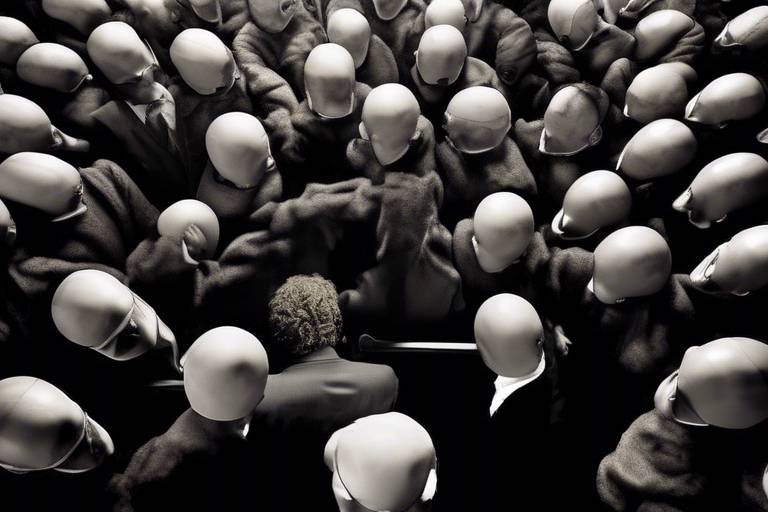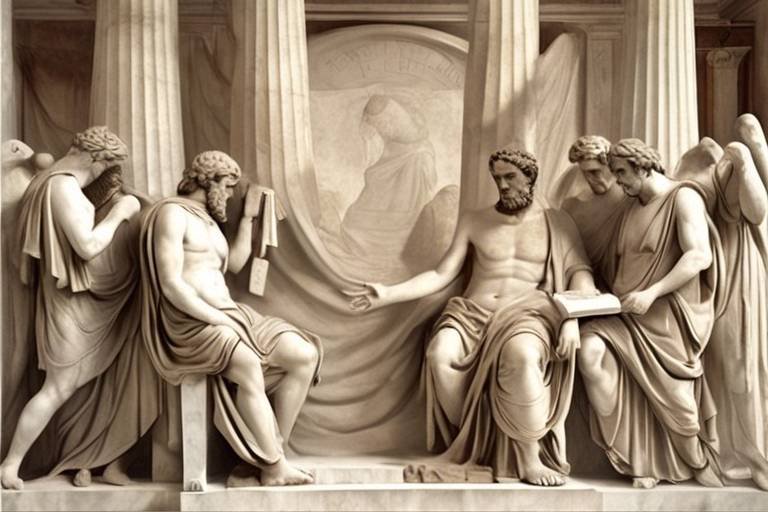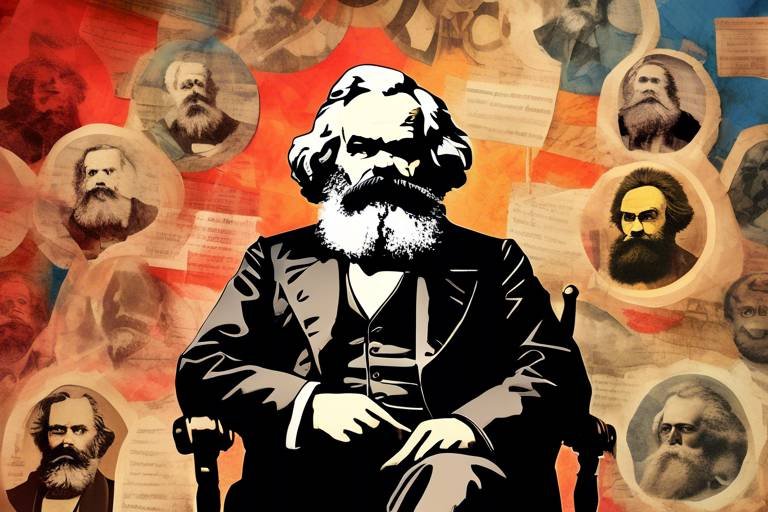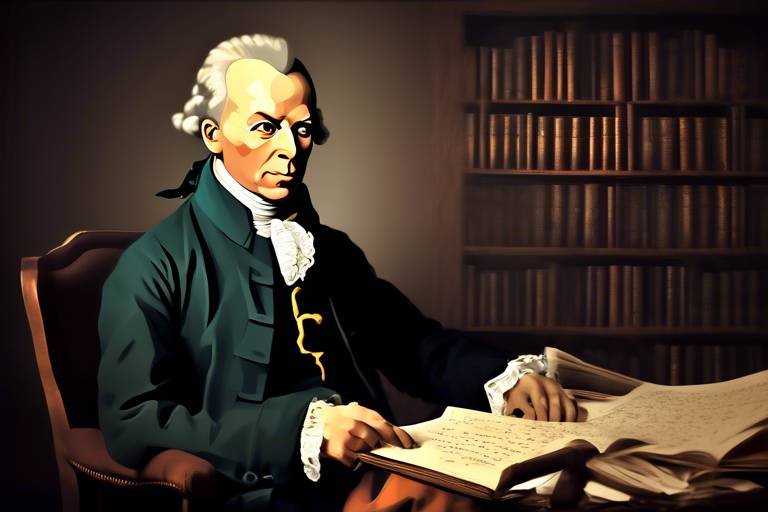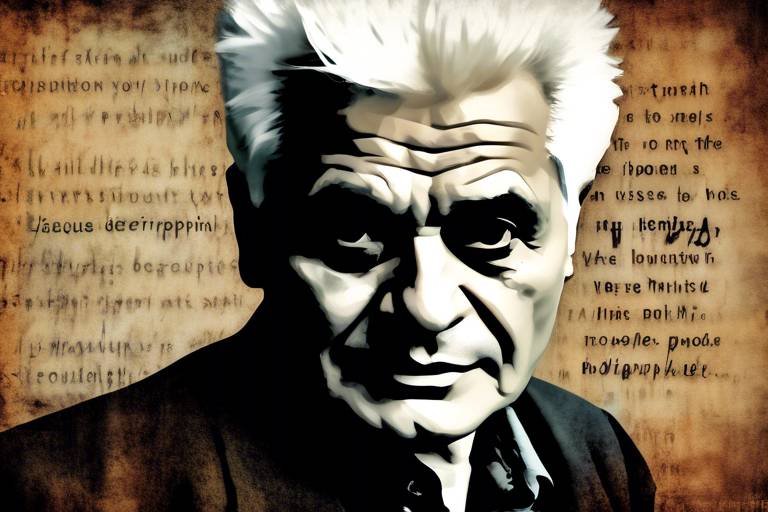Understanding the Essence of Plato's Philosophy
Plato, the ancient Greek philosopher, is often hailed as one of the most influential thinkers in Western philosophy. His ideas have shaped not only philosophical discourse but also the way we perceive reality, knowledge, and ethics. In this article, we will embark on a journey to explore the fundamental concepts of Plato's philosophy, examining how his thoughts on reality and knowledge resonate even today. From the Theory of Forms to the Allegory of the Cave, we will uncover how Plato's insights provide a framework for understanding existence and moral virtue in our contemporary world. So, what makes Plato's philosophy so timeless? Let’s dive in!
At the heart of Plato's philosophy lies the Theory of Forms. This theory posits that non-material abstract forms, or ideas, represent the most accurate reality, transcending the physical world we perceive through our senses. Imagine a perfect circle; while we can draw circles, none can capture the essence of the 'ideal' circle. Plato argues that these forms exist in a realm beyond our tangible reality, serving as the blueprint for all things. This perspective not only reshapes our understanding of existence but also raises profound questions about knowledge itself. If the physical world is merely a shadow of the true forms, how can we claim to know anything at all?
One of Plato's most famous illustrations is the Allegory of the Cave, which serves as a metaphor for the transformative journey from ignorance to knowledge. Picture this: prisoners are chained inside a dark cave, only able to see shadows cast on the wall by objects behind them. These shadows represent the limited perceptions of reality most people have. When one prisoner escapes and discovers the outside world, he realizes that the shadows are mere illusions. This allegory emphasizes the importance of philosophical inquiry, suggesting that true enlightenment comes from questioning our beliefs and seeking deeper truths.
In exploring the nature of reality, Plato differentiates between the world of appearances and the world of forms. The world of appearances, which we experience through our senses, is deceptive and ever-changing. In contrast, the world of forms is eternal and unchanging, representing the true essence of all things. This duality shapes Plato's metaphysical perspective, challenging us to look beyond sensory perception. It prompts us to ask ourselves: Are we merely accepting what we see, or are we striving to understand the underlying truths that govern our existence?
Examining the shadows in the cave, we find a poignant lesson about how illusions can mislead individuals. Just as the prisoners mistake shadows for reality, we often accept superficial interpretations of truth. This highlights the necessity of philosophical education. Plato believed that through rigorous questioning and contemplation, we can uncover deeper truths beyond mere appearances. This journey is not always easy; it requires us to confront uncomfortable realities and challenge our preconceived notions.
The transformative process of seeking knowledge is fraught with challenges, yet it is immensely rewarding. Plato illustrates this journey as a climb out of the cave into the light of understanding. Each step toward enlightenment represents a struggle against ignorance, but the rewards are profound. As individuals seek knowledge, they not only gain insight into the nature of reality but also develop a deeper understanding of themselves and their place in the world. This journey is a testament to the power of philosophical inquiry in shaping our lives.
In Plato's framework, a crucial distinction exists between knowledge and belief. Knowledge, according to Plato, is justified and certain, while belief remains subjective and uncertain. This distinction is vital for understanding how we form our convictions. Knowledge is akin to a firm foundation built on reason and evidence, while belief can be as fragile as a house of cards, susceptible to change and doubt. This raises an essential question: Are we content with mere belief, or are we striving for the certainty that comes with true knowledge?
Plato's ethical framework revolves around the concept of virtue as knowledge. He posits that understanding the good leads to virtuous actions, forming the foundation of his moral philosophy. This idea suggests that if individuals truly comprehend what is good, they will naturally act in accordance with it. It challenges us to consider the role of education and understanding in cultivating virtue. How can we foster a society where individuals are motivated by genuine knowledge of the good?
In Plato's vision, the ideal rulers are philosopher-kings—wise individuals who govern not for personal gain but for the common good. This relationship between wisdom and governance highlights how knowledge informs ethical leadership. Philosopher-kings possess the understanding necessary to create a just society, emphasizing that those in power must be guided by knowledge and virtue rather than ambition and desire. This raises a thought-provoking question: In our own societies, are we prioritizing wisdom in our leaders, or are we settling for popularity?
Finally, Plato's vision of justice is intricately linked to the harmony of the soul and the structure of society. In his work, "The Republic," he explores how justice is achieved when individuals perform their roles in society according to their abilities and virtues. This concept of justice goes beyond mere legal frameworks; it embodies the pursuit of the common good. It challenges us to reflect on our own roles within society and consider how we can contribute to a more just and harmonious community.
- What is the Theory of Forms? The Theory of Forms posits that non-material abstract forms represent the most accurate reality, beyond our sensory experiences.
- How does the Allegory of the Cave relate to knowledge? The Allegory of the Cave illustrates the journey from ignorance to enlightenment, emphasizing the importance of philosophical inquiry.
- What is the distinction between knowledge and belief in Plato's philosophy? Knowledge is justified and certain, while belief is subjective and uncertain.
- Who are philosopher-kings? Philosopher-kings are ideal rulers who govern based on wisdom and knowledge, aiming for the common good.
- How does Plato define justice? Plato defines justice as the harmony of the soul and society, achieved when individuals fulfill their roles according to their virtues.

The Theory of Forms
Plato's Theory of Forms is a cornerstone of his philosophical thought, representing a paradigm shift in how we understand reality. At its core, this theory posits that beyond our tangible world lies a realm of non-material, abstract forms or ideas, which are the true essence of all things. Imagine, if you will, a perfect circle. In our physical world, every circle we draw is merely an approximation, flawed by the limitations of our tools and perceptions. However, the Form of a Circle exists in a realm of perfection, embodying the ideal characteristics of circularity. This distinction between the physical and the ideal is crucial for grasping Plato's metaphysical landscape.
According to Plato, the physical world is merely a shadow of this higher reality, where the Forms reside. This leads to a fundamental question: how do we access this world of Forms? Plato believed that knowledge is not something we acquire through sensory experience but rather something we remember. He argued that our souls, before being trapped in our physical bodies, had direct experience of these Forms. Thus, learning becomes a process of recollection, a journey to rediscover the truths we once knew. This perspective challenges our conventional understanding of education and knowledge acquisition.
The implications of the Theory of Forms extend beyond metaphysics into the realms of ethics and politics. For instance, if we consider the Form of the Good, we can see how it influences our understanding of morality. Plato argued that to act virtuously, one must understand the Good, as it is the ultimate source of all virtue. This connection between knowledge and virtue is pivotal in establishing a moral framework that transcends mere opinion or belief.
To further illustrate the significance of the Theory of Forms, let's explore some key aspects:
| Aspect | Description |
|---|---|
| Reality vs. Appearance | The distinction between the world of Forms (true reality) and the physical world (mere appearances). |
| Knowledge vs. Belief | True knowledge is about understanding the Forms, while belief is subjective and often based on sensory experiences. |
| Ethics | Understanding the Form of the Good is essential for virtuous actions. |
In essence, Plato's Theory of Forms is not just an abstract concept; it serves as a guide for understanding existence, knowledge, and morality. It challenges us to look beyond the surface and question the very nature of what we perceive. By engaging with these ideas, we embark on a philosophical journey that can lead to profound insights about ourselves and the world around us. So, the next time you encounter something in the physical world, ask yourself: what is the Form behind this? What deeper truths might be lurking just beyond the surface?

Plato's Allegory of the Cave
Plato's Allegory of the Cave is not just a tale; it's a profound metaphor that captures the essence of human existence and our quest for knowledge. Imagine being trapped in a dark cave, chained in such a way that you can only see the wall in front of you. Behind you, there’s a fire, and between the fire and your position are people carrying objects that cast shadows on the wall. These shadows represent the only reality you’ve ever known. This scenario raises an intriguing question: how do we know what is real? The allegory serves as a powerful illustration of how perception can be misleading, and how enlightenment requires a journey beyond the confines of our limited experiences.
In this allegory, Plato suggests that most people live their lives in a state of ignorance, mistaking shadows for reality. The shadows are mere reflections of the true forms that exist outside the cave, which can only be perceived through philosophical inquiry and critical thinking. This process of moving from darkness to light symbolizes the transformative journey of gaining knowledge. It’s like stepping out of a dense fog into a bright, clear day—suddenly, everything is illuminated, and your understanding deepens.
Furthermore, the allegory emphasizes the importance of education and philosophical exploration. The journey to enlightenment is not easy; it requires effort, courage, and a willingness to question what we think we know. As the prisoner escapes the cave and ascends into the light, he experiences discomfort and confusion. This mirrors the challenges we face when confronting new ideas that challenge our long-held beliefs. However, once he acclimates to the light, he begins to understand the true nature of reality, recognizing that the world outside the cave is far richer and more complex than he ever imagined.
Plato's distinction between the world of appearances and the world of forms is crucial in understanding his metaphysical perspective. The world of appearances is akin to the shadows on the cave wall—fleeting, deceptive, and ultimately illusory. In contrast, the world of forms represents the true essence of things, the unchanging truths that underpin our reality. This duality challenges us to look beyond the surface and seek deeper truths, prompting us to ask ourselves: what do we truly know?
When analyzing the shadows in the cave, it becomes evident that they symbolize the illusions that can mislead individuals. Just as the prisoners mistake shadows for reality, we too can fall prey to misinformation and superficial understandings. This is where philosophical education becomes essential. By engaging in critical thinking and questioning our assumptions, we can move beyond mere appearances and uncover the deeper truths that lie beneath.
The transformative process of seeking knowledge is fraught with challenges, akin to climbing a steep mountain. As individuals strive for enlightenment, they must navigate through confusion and discomfort, often feeling lost in the process. Yet, the rewards of this journey are immense. Enlightenment brings clarity, purpose, and a profound understanding of oneself and the world. In Plato’s framework, this journey is not just an individual pursuit; it is a collective endeavor that benefits society as a whole.
Ultimately, Plato's Allegory of the Cave encourages us to reflect on our own lives. Are we content with the shadows, or are we willing to venture into the light? The allegory serves as a reminder that the pursuit of knowledge is not merely an academic exercise; it is a fundamental aspect of our humanity. By striving for understanding and embracing the journey of enlightenment, we can break free from the chains of ignorance and discover the richness of true reality.
- What is the main message of Plato's Allegory of the Cave? The main message is that reality is often obscured by our perceptions, and true knowledge requires a journey beyond superficial appearances.
- How does the allegory relate to modern life? The allegory highlights the importance of critical thinking and questioning assumptions, which is crucial in navigating today’s information-rich environment.
- What does the journey out of the cave symbolize? The journey symbolizes the transformative process of gaining knowledge and enlightenment, moving from ignorance to understanding.
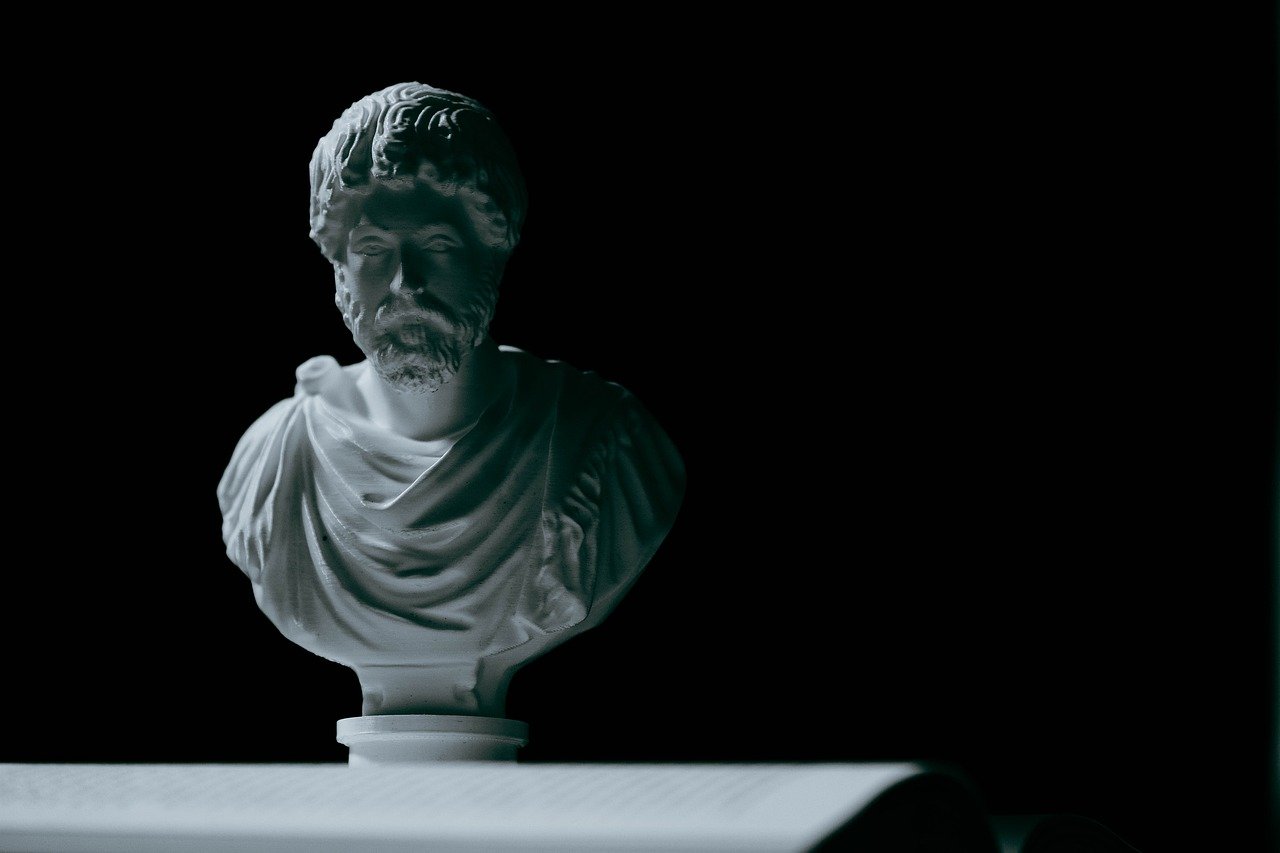
The Nature of Reality
When we dive into Plato's philosophy, we encounter a fascinating distinction between two realms: the world of appearances and the world of forms. Imagine walking through a bustling marketplace filled with vibrant colors, sounds, and smells. This sensory world is what we perceive daily, but Plato argues that it is merely a shadow of a deeper reality. In his view, the true essence of existence lies not in what we can see or touch, but in the abstract forms that represent the ideal versions of all things.
To illustrate this, think about a perfect circle. You might draw a circle on paper, but it will never be as flawless as the concept of a circle itself. This is what Plato refers to as the world of forms—a place where ideals exist, untouched by the imperfections of the physical world. According to Plato, understanding this distinction is crucial for grasping the essence of reality. He believed that the physical world is transient and ever-changing, while the world of forms is eternal and unchanging.
This philosophy leads us to ponder: if our senses can deceive us, how can we trust our perceptions? Plato's answer lies in the pursuit of knowledge through philosophical inquiry. By engaging in deep thinking and dialogue, we can begin to peel back the layers of illusion that cloud our understanding. The journey to grasp the true nature of reality is not just an intellectual exercise; it's a transformative experience that challenges us to rethink our beliefs and assumptions.
Plato’s metaphysical perspective also raises intriguing questions about the nature of knowledge itself. He asserts that true knowledge is not merely a collection of facts or beliefs, but rather a justified understanding of the forms. This leads us to differentiate between two key concepts:
- Knowledge: Justified, true belief that is certain and unshakeable.
- Belief: A subjective interpretation of reality that can be influenced by emotions and perceptions.
In this framework, knowledge stands as a beacon guiding us through the fog of illusion, helping us to navigate our existence with clarity and purpose. Plato's insistence on the importance of philosophical education emphasizes that without questioning and seeking deeper truths, we risk remaining in a state of ignorance, much like the prisoners in his famous Allegory of the Cave.
In summary, understanding the nature of reality according to Plato involves recognizing the limitations of our sensory experiences and embracing the pursuit of higher knowledge. It invites us to embark on an intellectual journey, one that not only enriches our understanding but also enhances our ability to engage meaningfully with the world around us. As we strive to comprehend these profound ideas, we may find ourselves asking: what truly constitutes reality, and how can we align our lives with the ideals that Plato so passionately advocated?

Shadows and Reflections
In Plato's Allegory of the Cave, the concept of shadows and reflections serves as a powerful metaphor for understanding the nature of reality and human perception. Imagine being trapped in a dark cave, where the only source of light comes from a fire behind you. The flickering shadows cast on the wall in front of you represent the only reality you've ever known. These shadows, mere imitations of the real objects, symbolize the deceptive nature of sensory experience. Just like a shadow, our perceptions can often mislead us, creating a distorted view of the world.
In this cave, prisoners are bound in such a way that they can only see the shadows and hear echoes of sounds, which they mistakenly believe to be the entirety of existence. This scenario prompts a critical question: How often do we, in our own lives, accept shadows as reality? The shadows signify the superficial understanding of life—what we see and hear without questioning the deeper truths behind them. Plato suggests that without philosophical inquiry, individuals remain confined to this limited perspective, unable to grasp the profound essence of reality.
To further illustrate this concept, consider the following comparisons:
| Shadows | Reality |
|---|---|
| Illusions and Deceptions | Truth and Understanding |
| Superficial Knowledge | Deep Insight |
| Temporary Perceptions | Enduring Wisdom |
This table encapsulates the stark contrast between the shadows of our limited understanding and the vibrant reality that lies beyond our immediate perceptions. Plato argues that to escape the cave and see the true forms, one must undergo a rigorous philosophical education. This journey is not merely about acquiring knowledge; it is about transforming one's entire way of seeing the world. As individuals strive to uncover these deeper truths, they often face challenges, such as the discomfort of questioning long-held beliefs and confronting the unknown.
Ultimately, the pursuit of knowledge and enlightenment is akin to stepping out of the cave into the blinding light of the sun. It is a journey filled with both obstacles and rewards. The moment a prisoner turns around and begins to see the fire and the objects casting the shadows, they are exposed to a reality that is far richer and more complex than they ever imagined. This transformative experience emphasizes the importance of seeking knowledge and understanding, as it allows individuals to break free from the chains of ignorance and embrace the fullness of existence.

The Journey to Enlightenment
Embarking on the journey to enlightenment is akin to setting sail on an uncharted sea, where the winds of curiosity and the currents of knowledge guide your vessel. Plato illustrates this profound journey through the allegory of the cave, where prisoners are shackled in darkness, only perceiving shadows of reality. This metaphor serves as a powerful reminder of how ignorance can cloud our understanding of the world. Just as sailors must learn to read the stars to navigate the vast ocean, individuals must engage in philosophical inquiry to uncover the deeper truths that lie beyond mere appearances.
As we navigate this journey, we encounter various challenges that test our resolve. The initial steps often feel daunting, much like the first plunge into icy waters. Many individuals find themselves hesitant to question the established norms and beliefs that have been instilled in them since birth. However, it's crucial to recognize that the discomfort of questioning is a necessary part of growth. Just as a seed must break through the soil to reach the sunlight, we too must confront our fears and uncertainties to achieve enlightenment.
Throughout this transformative process, individuals may experience a range of emotions, from confusion to exhilaration. The realization that what we once believed to be true may not hold up under scrutiny can be jarring. Yet, this is where the journey becomes truly rewarding. As we shed the layers of ignorance, we begin to see the world with newfound clarity. Our understanding deepens, and we find ourselves drawn toward the light of knowledge, much like moths to a flame. This journey is not merely about acquiring information; it's about transforming our very being.
Plato emphasizes that the journey to enlightenment is not a solitary endeavor. Engaging in dialogue with others, sharing insights, and challenging each other's perspectives enriches our understanding. It's through these interactions that we can refine our thoughts and develop a more comprehensive view of reality. Just as a blacksmith hones a blade through repeated strikes, our ideas are sharpened through discussion and debate.
Ultimately, the journey to enlightenment is a lifelong pursuit. It requires a commitment to continuous learning and self-reflection. As we strive to uncover the layers of truth, we must remain open to new ideas and experiences. In doing so, we cultivate a mindset that not only seeks knowledge but also embraces the complexity of existence. The journey may be fraught with obstacles, but the rewards—greater wisdom, understanding, and a deeper connection to the world—are well worth the effort.
- What is the significance of Plato's Allegory of the Cave?
It highlights the difference between the world of appearances and the world of forms, illustrating the transformative journey from ignorance to knowledge. - How does one begin their journey to enlightenment?
Start by questioning your beliefs, engaging in philosophical discussions, and being open to new perspectives. - Is the journey to enlightenment a one-time event?
No, it is a lifelong pursuit that requires continuous learning and self-reflection. - Why is philosophical inquiry important?
It helps individuals uncover deeper truths and understand the complexities of existence beyond mere appearances.

Knowledge and Belief
When we dive into the depths of Plato's philosophy, one of the most striking distinctions he makes is between knowledge and belief. Imagine standing at the edge of a vast ocean. The ocean represents knowledge, deep and expansive, filled with truths waiting to be discovered. In contrast, belief is like the waves lapping at the shore—constantly shifting, sometimes crashing, but never as stable or profound as the ocean itself. For Plato, knowledge is not just a collection of facts; it is a justified true belief that stands firm against the tides of uncertainty.
Plato argues that true knowledge is based on certainty and justification, while belief can often be influenced by personal opinions and emotions. To illustrate this, consider the following:
| Aspect | Knowledge | Belief |
|---|---|---|
| Definition | Justified true belief | Subjective conviction |
| Certainty | Unchanging and certain | Variable and uncertain |
| Basis | Evidence and reasoning | Personal opinion |
This table highlights how knowledge is grounded in evidence and rational thought, whereas belief can be swayed by emotions and personal experiences. Plato believed that many people operate under a false sense of knowledge, mistaking their beliefs for truths. This is where the philosopher's role becomes crucial. Philosophers, in Plato's view, are those who seek to uncover the deeper truths behind appearances, transforming belief into knowledge through rigorous questioning and examination.
Furthermore, Plato’s distinction between knowledge and belief leads us to reflect on the implications of our understanding of the world. How often do we take things at face value without questioning them? Just like the prisoners in the Allegory of the Cave, we might be trapped in a world of shadows, mistaking illusions for reality. Therefore, engaging in philosophical inquiry is not just an academic exercise; it is a vital process for personal and societal growth.
In conclusion, Plato's insights into knowledge and belief encourage us to challenge our assumptions and strive for a deeper understanding of the truths that govern our lives. By doing so, we not only enhance our own knowledge but also contribute to a more enlightened society, one that values reason and evidence over mere opinion.
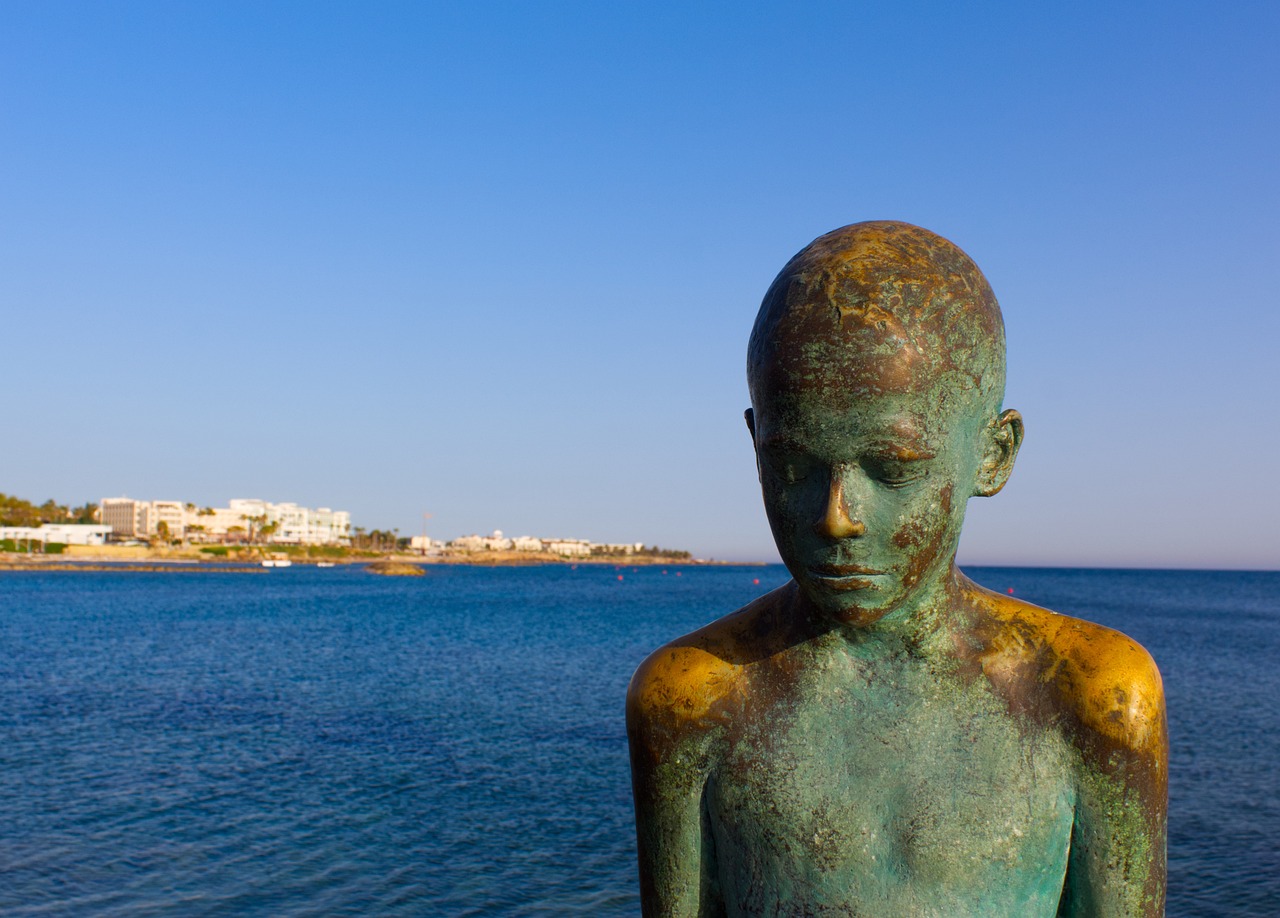
Ethics and Virtue
Plato’s ethical framework is nothing short of fascinating, as it revolves around the idea that virtue is knowledge. This concept suggests that if a person truly understands what is good, they will naturally act in accordance with that understanding. Imagine knowing the path to a beautiful garden; if you truly grasp the beauty and the benefits of being there, why would you choose to wander off into a thorny thicket instead? This analogy perfectly encapsulates Plato's belief that ignorance is the root of immoral behavior. When individuals lack knowledge about what is genuinely good, they can easily stray into unethical actions.
In Plato's view, the ultimate goal of human life is to achieve the good, which he describes as the highest form of knowledge. This leads us to the idea that ethical behavior is not just about following rules or societal norms, but rather about striving for a deeper understanding of what it means to live a good life. To Plato, ethical education is paramount. He believed that through philosophical inquiry and reflection, individuals could cultivate their understanding of virtue. This journey of self-discovery and learning is essential for anyone who wishes to lead a virtuous life.
To illustrate this further, let’s consider the four cardinal virtues that Plato discusses: wisdom, courage, moderation, and justice. Each of these virtues plays a critical role in the pursuit of the good. Here’s a simple table summarizing these virtues and their significance:
| Virtue | Definition | Importance |
|---|---|---|
| Wisdom | The ability to make sound judgments and decisions. | Guides individuals in understanding what is truly good. |
| Courage | The strength to act rightly in the face of fear. | Enables one to stand firm in their beliefs and values. |
| Moderation | The practice of self-control and balance. | Helps individuals avoid excess and live harmoniously. |
| Justice | The quality of being fair and equitable. | Ensures that individuals and society function well together. |
These virtues are interrelated, creating a framework that supports ethical living. For instance, wisdom allows for the discernment needed to practice justice fairly, while courage empowers individuals to uphold their beliefs even when faced with opposition. This interconnectedness highlights how a lack of understanding in one area can lead to deficiencies in others, further emphasizing the importance of knowledge in ethical behavior.
Moreover, Plato believed that understanding the good leads to virtuous actions, thereby forming the foundation of his moral philosophy. He suggested that the more one learns about the good, the more they will be inclined to act virtuously. It’s a bit like planting seeds in a garden; the more you nurture them with knowledge and understanding, the more they will flourish into beautiful flowers of ethical behavior.
In conclusion, Plato’s ethics are not just theoretical musings; they are a call to action for individuals to seek knowledge and understanding. By doing so, they can cultivate virtue and contribute positively to society. The journey towards ethical living is a lifelong commitment to learning, reflecting, and growing, which ultimately leads to a more harmonious existence for both the individual and the community.
- What is the main idea of Plato's ethics?
Plato's ethics centers around the belief that virtue is knowledge, meaning that understanding the good leads to ethical behavior. - How do the cardinal virtues relate to each other?
The cardinal virtues are interconnected, each supporting and enhancing the others to create a comprehensive framework for ethical living. - Why is philosophical inquiry important in Plato's ethics?
Philosophical inquiry is essential as it helps individuals gain the knowledge necessary to understand the good and act virtuously.
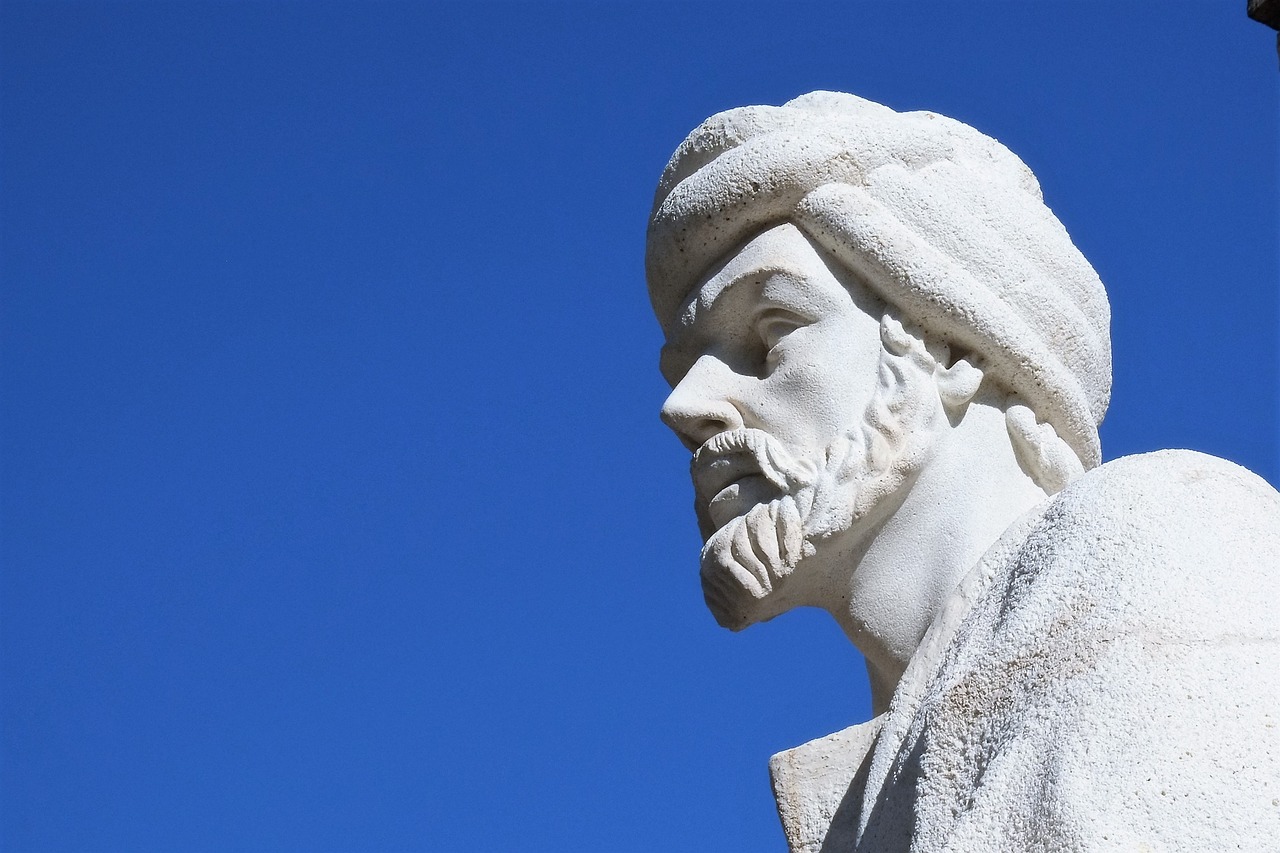
The Role of the Philosopher-King
In Plato's vision, the philosopher-king stands as the epitome of wisdom and governance. Imagine a ruler who is not only a leader but also a profound thinker, someone who understands the deeper truths of existence and the nature of justice. Plato believed that only those who have thoroughly grasped the essence of knowledge and virtue should hold positions of power. This concept is revolutionary, suggesting that political authority should be in the hands of those who truly know what is good for society.
The idea of the philosopher-king is rooted in Plato's conviction that knowledge is the foundation of ethical leadership. A philosopher-king is not merely a ruler; they embody the ideal of a wise leader who governs not for personal gain, but for the common good. This is crucial because, in Plato's eyes, a ruler devoid of philosophical insight is akin to a ship captain without navigational skills—lost at sea, leading others into chaos. To illustrate this, consider the following attributes that define a philosopher-king:
- Wisdom: They possess profound knowledge and understanding of the forms, particularly the Form of the Good.
- Justice: Their decisions are guided by fairness and the pursuit of the common good, rather than self-interest.
- Education: They have undergone rigorous philosophical training, enabling them to discern truth from illusion.
- Vision: They have the foresight to understand the long-term implications of their policies and actions.
Plato argues that the philosopher-king's role extends beyond mere governance; they are also tasked with educating the citizens. This educational mandate is vital because it ensures that the populace is not only informed but also capable of understanding and valuing the principles of justice and virtue. In this sense, the philosopher-king acts as both a ruler and a teacher, fostering a society that appreciates wisdom and ethical behavior.
Moreover, the philosopher-king's governance is characterized by a unique relationship with truth. Unlike conventional leaders who may bend the truth for political expediency, the philosopher-king strives to align their policies with the ultimate truths of existence. This commitment to truth fosters a sense of trust and stability within the society, as citizens can rely on their leaders to act in accordance with what is genuinely beneficial for the community.
In conclusion, the role of the philosopher-king is a profound commentary on the intersection of knowledge and power. Plato's ideal ruler is not merely a figure of authority but a beacon of wisdom, guiding society towards a more just and harmonious existence. By placing the philosopher-king at the helm of governance, Plato challenges us to rethink our understanding of leadership and the qualities that truly matter in those who hold power.
- What is a philosopher-king? A philosopher-king is an ideal ruler in Plato's philosophy who possesses wisdom and knowledge, governing for the common good.
- Why is knowledge important for leadership? Knowledge ensures that leaders make informed decisions that benefit society, rather than acting out of self-interest.
- How does the philosopher-king educate citizens? The philosopher-king educates citizens about justice, virtue, and the importance of philosophical inquiry, fostering a well-informed populace.
- What are the key qualities of a philosopher-king? Wisdom, justice, education, and vision are essential qualities that define a philosopher-king.

Justice in Plato's Republic
In Plato's Republic, the concept of justice is not merely a legalistic term; it is a profound principle that governs both the individual and the state. Plato presents justice as a form of harmony, where each part of society, much like a well-tuned orchestra, plays its role to create a beautiful symphony. This analogy highlights that just as every musician must understand their part to contribute to the overall music, every individual in society must understand their role to achieve justice. Plato argues that justice is achieved when everyone performs their designated function according to their abilities and nature.
To delve deeper into this idea, Plato introduces the notion of the tripartite soul, which mirrors the structure of society itself. He divides the soul into three parts: the rational, the spirited, and the appetitive. Similarly, society consists of three classes: the rulers (philosopher-kings), the warriors, and the producers. Justice occurs when the rational part of the soul (representing wisdom) rules over the spirited (courage) and appetitive (desire) aspects, just as the philosopher-kings govern the state. This alignment ensures that the individual and society function in harmony, promoting the common good.
Furthermore, Plato's vision of justice transcends mere individual ethics; it encompasses the entire societal structure. He argues that a just society is one where the rulers possess the knowledge and virtue necessary to guide the state wisely. This leads to the idea of the philosopher-king, a ruler who understands the Forms, especially the Form of the Good, and can thus make decisions that benefit the entire community. Plato emphasizes that only those who truly understand what is good can create laws and policies that foster justice.
To illustrate this further, consider the following table that summarizes the relationship between the individual soul and the structure of society:
| Part of the Soul | Corresponding Class in Society | Virtue |
|---|---|---|
| Rational | Rulers (Philosopher-Kings) | Wisdom |
| Spirited | Warriors | Courage |
| Appetitive | Producers (Workers) | Moderation |
In Plato's framework, justice is not a static concept; it is dynamic and requires constant nurturing. Individuals must engage in philosophical inquiry and self-examination to align their personal virtues with the greater good. This pursuit of justice is not just about maintaining order; it is about creating a society where every individual can flourish. Plato's vision challenges us to reflect on our own roles within our communities and to strive for a balance that promotes justice for all.
Ultimately, Plato's exploration of justice in the Republic serves as a timeless reminder that justice is rooted in knowledge, virtue, and the collective effort of individuals working towards a common goal. As we navigate the complexities of modern society, his insights remain relevant, urging us to consider how we can contribute to a just world.
- What is the main idea of justice in Plato's Republic? Plato views justice as harmony achieved when each part of society performs its role effectively.
- How does Plato relate the soul to society? He parallels the tripartite soul with the three classes of society, emphasizing that justice arises when each part fulfills its function.
- Who are the philosopher-kings? Philosopher-kings are rulers who possess knowledge and virtue, enabling them to govern wisely for the common good.
Frequently Asked Questions
- What is Plato's Theory of Forms?
Plato's Theory of Forms suggests that non-material abstract forms, or ideas, are the most accurate representation of reality. These forms exist in a realm beyond our sensory experiences and are considered the true essence of things. Understanding this theory helps us grasp the difference between what we see and what truly exists.
- How does the Allegory of the Cave illustrate Plato's views?
The Allegory of the Cave is a powerful metaphor that depicts individuals trapped in a cave, mistaking shadows for reality. It symbolizes the journey from ignorance to enlightenment, showing how philosophical inquiry can lead to a deeper understanding of truth beyond mere appearances.
- What is the difference between knowledge and belief in Plato's philosophy?
In Plato's framework, knowledge is justified and certain, while belief is subjective and uncertain. Knowledge is about understanding the true nature of reality, while belief can be based on personal opinions and perceptions, which may not necessarily reflect the truth.
- What role do philosopher-kings play in Plato's vision of governance?
Plato advocates for philosopher-kings as the ideal rulers, arguing that those who possess wisdom and knowledge should lead society. This concept emphasizes the connection between ethical leadership and the well-being of the community, suggesting that informed governance can lead to a just society.
- How does Plato define justice in his Republic?
In Plato's Republic, justice is achieved through the harmony of the soul and the proper structure of society. He believes that when individuals fulfill their roles and work together for the common good, justice prevails, linking ethics with the overall health of the community.


